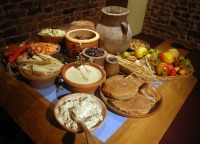You might be wondering…”What the heck are lectins?”
The simplest answer is that they’re the proteins found in some of the healthiest foods that we eat.
You might think that means that they're good for you, but the exact opposite is true.
How can that be? Read on.
Lectins are found in about one-third of the foods that we eat.
TweetYou can find them in grains and raw legumes, but they’re also found in dairy and seafood.
Some of the most common sources of lectin include:
- Grains that are high in gluten. Wheat is very high in lectins, and so are oils made from grains

- Legumes such as beans, soy and peanuts, as well as their oils
- Dairy products from animals that are fed grain instead of grass
- Plants in the nightshade family like tomatoes, potatoes, peppers and eggplant
Lectins in plants help to protect them against pests and disease.
Some scientists think they developed Lectin as a way to keep seeds from breaking down. Because of lectins, when animals ate plants the seeds would pass whole so that they could later grow into new plants.
Why Should I Care About Lectins?
When we eat too many lectins, they attach to our intestinal wall’s cells. They can damage our gut lining and cause inflammation.
This not only makes it harder for us to absorb important nutrients but may also play a role in health problems like leaky gut and autoimmune diseases.
The good news is that by preparing food properly, you can offset lectins’ disadvantages and still get the other benefits offered by the foods that contain them.
When we eat too many lectins we experience stomach problems. They are a result of our bodies’ immune systems recognizing them as a problem.
When this happens, the body attacks its own structures. This is how autoimmune diseases can get started.
What's the Fix?
Left alone lectins keep us from accessing the nutrients in our foods. The best way to avoid these problems is to take them from their raw state.
This can be done by letting them sprout;
- Unsprouted grains have lower availability of protein than sprouted ones do.
- By contrast, when you allow these grains to sprout, you boost the body’s use of vitamin B12, iron, magnesium, zinc and phosphorous.
Another way to eliminate the problem and gain nutrition of lectin-rich food is to soak them or to cook them properly.
This is why people soak and rinse beans before cooking them. When you soak them overnight and rinse them before boiling, you remove a lot of lectins.
For some foods, simply boiling will do the trick. Fermenting also works and so does cooking in a pressure cooker.
Because most foods high in lectin are cooked before we eat them, we don’t hear much about the problem, but if you suffer from leaky gut or other digestive issues, you may want to learn more about lectin’s role in gut heath.
Diets that avoid lectins exclude grains, beans, nuts, seeds and dairy.
Yours in health and happiness,
Danette
P.S. Please help get the word out by sharing this info. with your friends and I always love to hear from you in the comments below!






